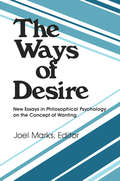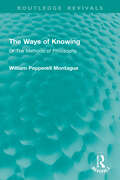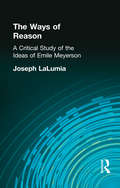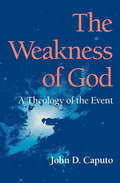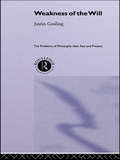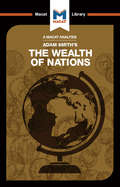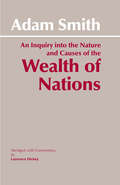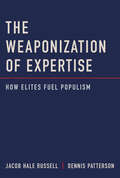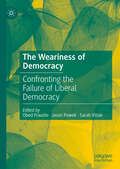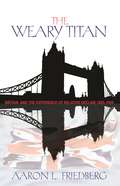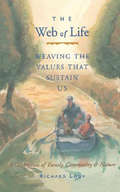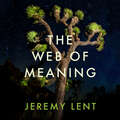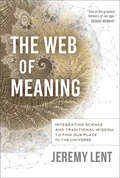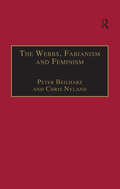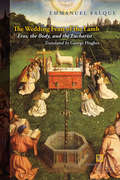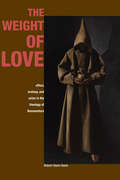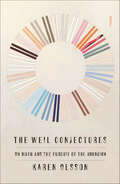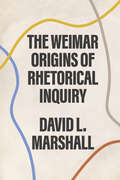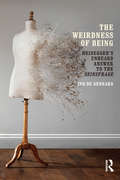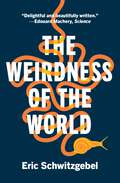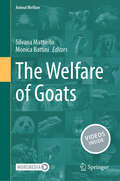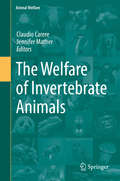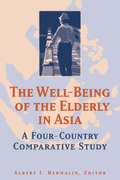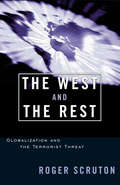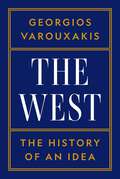- Table View
- List View
The Ways of Desire
by Joel MarksFirst Published in 2017. Routledge is an imprint of Taylor & Francis, an Informa company.
The Ways of Knowing: Or The Methods of Philosophy (Routledge Revivals)
by William Pepperell MontagueThe Ways of Knowing (1925) examines the ways of attaining knowledge and verifying it, looking at the six methods of logic. It is also concerned with the epistemological problem of interpreting the relation of truth to the mind.
The Ways of Reason: A Critical Study of the Ideas of Emile Meyerson
by Joseph LaLumiaFirst published in 2002. Routledge is an imprint of Taylor & Francis, an informa company.
The Weakness of God: A Theology of the Event (Indiana Series in the Philosophy of Religion)
by John D. CaputoThe author of What Would Jesus Deconstruct? makes &“a bold attempt to reconfigure the terms of debate around the topic of divine omnipotence&” (Choice). Applying an ever more radical hermeneutics—including Husserlian and Heideggerian phenomenology, Derridian deconstruction, and feminism—John D. Caputo breaks down the name of God in this irrepressible book. Instead of looking at God as merely a name, Caputo views it as an event, or what the name conjures or promises in the future. For Caputo, the event exposes God as weak, unstable, and barely functional. While this view of God flies in the face of most religions and philosophies, it also puts up a serious challenge to fundamental tenets of theology and ontology. Along the way, Caputo&’s readings of the New Testament, especially of Paul&’s view of the Kingdom of God, help to support the &“weak force&” theory. This penetrating work cuts to the core of issues and questions—What is the nature of God? What is the nature of being? What is the relationship between God and being? What is the meaning of forgiveness, faith, piety, or transcendence?—that define the terrain of contemporary philosophy of religion. &“Caputo comes out of the closet as a theologian in this work.&” —Catherine Keller, Drew University &“Caputo has a gift for explaining Continental philosophy&’s jargon succinctly and accurately, and despite technical and foreign terms, this book will engage upper-level undergraduates. Includes scriptural and general indexes . . . Highly recommended.&” —Choice
The Weakness of the Will (Problems of Philosophy)
by Justin GoslingFirst Published in 2004. Routledge is an imprint of Taylor & Francis, an informa company.
The Wealth of Nations
by John CollinsAdam Smith’s 1776 Inquiry into The Nature and Causes of the Wealth of Nations – more often known simply as The Wealth of Nations – is one of the most important books in modern intellectual history. Considered one of the fundamental works of classical economics, it is also a prime example of the enduring power of good reasoning, and the ability of reasoning to drive critical thinking forward. Adam Smith was attempting to answer two complex questions: where does a nation’s wealth come from, and what can governments do to increase it most efficiently? At the time, perhaps the most widely accepted theory, mercantilism, argued that a nation’s wealth was literally the amount of gold and silver it held in reserve. Smith, meanwhile, weighed the evidence and came to a different conclusion: a nation’s wealth, he argued, lay in its ability to encourage economic activity, largely without government interference. Underlying this radical redefinition was the revolutionary concept that powered Smith’s reasoning and which continues to exert a vast influence on economic thought: the idea that markets are self-regulating. Pitting his arguments against those of his predecessors, Smith carefully and persuasively reasoned out a strong case for free markets that reshaped government economic policies in the 19th-century and continues to shape global prosperity today.
The Wealth of Nations: An Inquiry Into The Nature And Causes Of The Wealth Of Nations (Hackett Classics)
by Adam Smith Laurence DickeyThis thoughtful new abridgment is enriched by the brilliant commentary which accompanies it. In it, Laurence Dickey argues that the Wealth of Nations contains--and conceals--a great deal of how Smith actually thought a commercial society works. Guided by his conviction that the so-called Adam Smith Problem--the relationship between ethics and economics in Smith's thinking--is a core element in the argument of the work itself, Dickey's commentary focuses on the devices Smith uses to ground his economics in broadly ethical and social categories. An unparalleled guide to an often difficult and perplexing work.
The Weaponization of Expertise: How Elites Fuel Populism
by Jacob Hale Russell Dennis PattersonThe problem with expertise—and the dark side of the equation &“knowledge = power.&”Experts are not infallible. Treating them as such has done us all a grave disservice and, as The Weaponization of Expertise makes painfully clear, given rise to the very populism that all-knowing experts and their elite coterie decry. Jacob Hale Russell and Dennis Patterson use the devastating example of the COVID-19 pandemic to illustrate their case, revealing how the hubris of all-too-human experts undermined—perhaps irreparably—public faith in elite policymaking. Paradoxically, by turning science into dogmatism, the overweening elite response has also proved deeply corrosive to expertise itself—in effect, doing exactly what elite policymakers accuse their critics of doing.A much-needed corrective to a dangerous blind faith in expertise, The Weaponization of Expertise identifies a cluster of pathologies that have enveloped many institutions meant to help referee expert knowledge, in particular a disavowal of the doubt, uncertainty, and counterarguments that are crucial to the accumulation of knowledge. At a time when trust in expertise and faith in institutions are most needed and most lacking, this work issues a stark reminder that a crisis of misinformation may well begin at the top.
The Weariness of Democracy: Confronting the Failure of Liberal Democracy
by Jason Powell Obed Frausto Sarah VitaleLiberal democracy today, having aligned itself with capitalism, is producing a generalized feeling of weariness and disillusionment with government among the citizenry of many countries. Because of a decades-long march of globalized capitalism, economic oligarchies have gained oppressive levels of political power, and as a result, the economic needs of many people around the world have been neglected. It then becomes essential to remember that our ability to change society emerges from our power to formulate different questions; or, in this case, alternative understandings of democracy. This book draws together a variety of alternative theories of democracies in a quest to expose readers to a selection of the most exciting and innovative new approaches to politics today. The consideration of these leading alternative conceptualizations of democracy is important, as it is now common to see xenophobic and racist rhetoric using the platform of liberal democracy to threaten ideas of plurality, diversity, equality, and economic justice. In looking at four different models of democracy (utopian democracy, radical democracy, republican democracy, and plural democracy) this book argues that encounters with alternate conceptualizations of democracy is necessary if citizens and scholars are going to understand the constellation of possibilities that exist for inclusive, plural, economically equal, and just societies.
The Weary Titan: Britain and the Experience of Relative Decline, 1895-1905
by Aaron L. FriedbergHow do statesmen become aware of unfavorable shifts in relative power, and how do they seek to respond to them? These are puzzles of considerable importance to theorists of international relations. As national decline has become an increasingly prominent theme in American political debate, these questions have also taken on an immediate, pressing significance. The Weary Titan is a penetrating study of a similar controversy in Britain at the turn of the twentieth century. Drawing on a wide variety of sources, Aaron Friedberg explains how England's rulers failed to understand and respond to the initial evidence of erosion in their country's industrial, financial, naval, and military power. The British example suggests that statesmen may be slow to recognize shifts in international position, in part because they rely heavily on simple but often distorting indicators of relative capabilities. In a new afterword, Friedberg examines current debates about whether America is in decline, arguing that American power will remain robust for some time to come.
The Web of Life: Weaving the Values That Sustain Us
by Richard LouvWith great warmth and wisdom, award-winning journalist Richard Louv explores the delicate strands of our lives: family, friendship, community, nature, time, and spirit.
The Web of Meaning: Integrating Science and Traditional Wisdom to Find Our Place in the Universe
by Jeremy Lent'The Web of Meaning is both a profound personal meditation on human existence and a tour-de-force weaving together of historic and contemporary world-wide secular and spiritual thought on the deepest question of all: why are we here?' Gabor Maté M.D., author, In The Realm of Hungry Ghosts: Close Encounters With Addiction'We need, now more than ever, to figure out how to make all kinds of connections. This book can help--and therefore it can help with a lot of the urgent tasks we face.' Bill McKibben, author, Falter: Has the Human Game Begun to Play Itself Out?As our civilization careens towards a precipice of climate breakdown, ecological destruction and gaping inequality, people are losing their existential moorings. Our dominant worldview of disconnection, which tells us we are split between mind and body, separate from each other, and at odds with the natural world, has passed its expiration date.Yet another world is possible.Award-winning author, Jeremy Lent, investigates humanity's age-old questions - who am I? why am I? how should I live? - from a fresh perspective, weaving together findings from modern systems thinking, evolutionary biology and cognitiveneuroscience with insights from Buddhism, Taoism and indigenous wisdom.The result is a breathtaking accomplishment: a rich, coherent worldview based on a deep recognition of connectedness within ourselves, between each other, and with the entire natural world.
The Web of Meaning: Integrating Science and Traditional Wisdom to Find Our Place in the Universe
by Jeremy Lent&“A profound personal meditation on human existence . . . weaving together . . . historic and contemporary thought on the deepest question of all: why are we here?&” —Gabor Maté M.D., author, In the Realm of Hungry Ghosts As our civilization careens toward climate breakdown, ecological destruction, and gaping inequality, people are losing their existential moorings. The dominant worldview of disconnection, which tells us we are split between mind and body, separate from each other, and at odds with the natural world, has been invalidated by modern science. Award-winning author Jeremy Lent, investigates humanity&’s age-old questions—Who am I? Why am I? How should I live?—from a fresh perspective, weaving together findings from modern systems thinking, evolutionary biology, and cognitive neuroscience with insights from Buddhism, Taoism, and Indigenous wisdom. The result is a breathtaking accomplishment: a rich, coherent worldview based on a deep recognition of connectedness within ourselves, between each other, and with the entire natural world. It offers a compelling foundation for a new philosophical framework that could enable humanity to thrive sustainably on a flourishing Earth.The Web of Meaning is for everyone looking for deep and coherent answers to the crisis of civilization. &“One of the most brilliant and insightful minds of our age, Jeremy Lent has written one of the most essential and compelling books of our time.&” —David Korten, author, When Corporations Rule the World and The Great Turning: From Empire to Earth Community &“We need, now more than ever, to figure out how to make all kinds of connections. This book can help—and therefore it can help with a lot of the urgent tasks we face.&” —Bill McKibben, author, Falter: Has the Human Game Begun to Play Itself Out?
The Webbs, Fabianism and Feminism: Fabianism and the Political Economy of Everyday Life (Avebury Series in Philosophy)
by Peter Beilharz Chris NylandThis book seeks to explore the understanding of Fabianism of both the Webbs and the Fabian Women’s Group and how this understanding shaped their views regarding such gender-centred issues as the family wage; protective labour law; and women’s place in the welfare state, the home and the labour market.
The Wedding Feast of the Lamb: Eros, the Body, and the Eucharist (Perspectives in Continental Philosophy)
by Emmanuel FalqueEmmanuel Falque's The Wedding Feast of the Lamb represents a turning point in his thought. Here, Falque links philosophy and theology in an original fashion that allows us to see the full effect of theology's "backlash" against philosophy. By attending closely to the incarnation and the eucharist, Falque develops a new concept of the body and of love: By avoiding the common mistake of "angelism"--consciousness without body--Falque considers the depths to which our humanity reflects animality, or body without consciousness. He shows the continued relevance of the question "How can this man give us his flesh to eat?" (John 6:52), especially to philosophy. We need to question the meaning of "this is my body" in "a way that responds to the needs of our time" (Vatican II). Because of the ways that "Hoc est corpus meum" has shaped our culture and our modernity, this is a problem both for religious belief and for culture.
The Weight of Love: Affect, Ecstasy, and Union in the Theology of Bonaventure
by Robert Glenn DavisSupplementing theological interpretation with historical, literary, and philosophical perspectives, The Weight of Love analyzes the nature and role of affectivity in medieval Christian devotion through an original interpretation of the writings of the Franciscan theologian Bonaventure. It intervenes in two crucial developments in medieval Christian thought and practice: the renewal of interest in the corpus of Dionysius the Areopagite in thirteenth-century Paris and the proliferation of new forms of affective meditation focused on the passion of Christ in the later Middle Ages. Through the exemplary life and death of Francis of Assisi, Robert Glenn Davis examines how Bonaventure traces a mystical itinerary culminating in the meditant’s full participation in Christ’s crucifixion. For Bonaventure, Davis asserts, this death represents the becoming-body of the soul, the consummation and transformation of desire into the crucified body of Christ.In conversation with the contemporary historiography of emotions and critical theories of affect, The Weight of Love contributes to scholarship on medieval devotional literature by urging and offering a more sustained engagement with the theological and philosophical elaborations of affectus. It also contributes to debates around the “affective turn” in the humanities by placing it within this important historical context, challenging modern categories of affect and emotion.
The Weil Conjectures: On Math and the Pursuit of the Unknown
by Karen OlssonA New York Times Editors' Pick and Paris Review Staff Pick"A wonderful book." --Patti Smith"I was riveted. Olsson is evocative on curiosity as an appetite of the mind, on the pleasure of glutting oneself on knowledge." --Parul Sehgal, The New York TimesAn eloquent blend of memoir and biography exploring the Weil siblings, math, and creative inspirationKaren Olsson’s stirring and unusual third book, The Weil Conjectures, tells the story of the brilliant Weil siblings—Simone, a philosopher, mystic, and social activist, and André, an influential mathematician—while also recalling the years Olsson spent studying math. As she delves into the lives of these two singular French thinkers, she grapples with their intellectual obsessions and rekindles one of her own. For Olsson, as a math major in college and a writer now, it’s the odd detours that lead to discovery, to moments of insight. Thus The Weil Conjectures—an elegant blend of biography and memoir and a meditation on the creative life.Personal, revealing, and approachable, The Weil Conjectures eloquently explores math as it relates to intellectual history, and shows how sometimes the most inexplicable pursuits turn out to be the most rewarding.
The Weimar Origins of Rhetorical Inquiry
by David L. MarshallThe Weimar origins of political theory is a widespread and powerful narrative, but this singular focus leaves out another intellectual history that historian David L. Marshall works to reveal: the Weimar origins of rhetorical inquiry. Marshall focuses his attention on Martin Heidegger, Hannah Arendt, Walter Benjamin, and Aby Warburg, revealing how these influential thinkers inflected and transformed problems originally set out by Max Weber, Carl Schmitt, Theodor Adorno, Hans Baron, and Leo Strauss. He contends that we miss major opportunities if we do not attend to the rhetorical aspects of their thought, and his aim, in the end, is to lay out an intellectual history that can become a zone of theoretical experimentation in para-democratic times. Redescribing the Weimar origins of political theory in terms of rhetorical inquiry, Marshall provides fresh readings of pivotal thinkers and argues that the vision of rhetorical inquiry that they open up allows for new ways of imagining political communities today.
The Weirdness of Being: Heidegger's Unheard Answer to the Seinsfrage
by Ivo De GennaroThe ongoing publication of Heidegger's complete works has called into question the interpretive and translative practices that have historicized Heidegger's thinking through the adaptation of categories and mind-sets inherited from metaphysics. Ivo De Gennaro argues that the posthumous treatises in particular - many of which have yet to be translated into English - show that the "other onset of thinking" that Being and Time inaugurated and which those historicizing accounts have interpreted and translated away, has already taken place. This book, on the other hand, speaks solely from that other onset, that of being itself. While arguing the "one-pointedness" of Heidegger's entire path of thinking, De Gennaro draws mainly on the posthumous treatises to offer both a provisional exploration of, and an introduction to, a thinking whose sense and implications have barely begun to emerge. This challenging and original interpretation marks an important contribution to Heidegger scholarship.
The Weirdness of the World
by Eric SchwitzgebelHow all philosophical explanations of human consciousness and the fundamental structure of the cosmos are bizarre—and why that&’s a good thingDo we live inside a simulated reality or a pocket universe embedded in a larger structure about which we know virtually nothing? Is consciousness a purely physical matter, or might it require something extra, something nonphysical? According to the philosopher Eric Schwitzgebel, it&’s hard to say. In The Weirdness of the World, Schwitzgebel argues that the answers to these and other fundamental questions about the world and our existence lie beyond our powers of comprehension. We can be certain only that the truth—whatever it is—is weird. Philosophy, he proposes, can aim to open—to reveal possibilities we had not previously appreciated—or to close, to narrow down to the one correct theory of the phenomenon in question. Schwitzgebel argues for a philosophy that opens.According to Schwitzgebel&’s &“Universal Bizarreness&” thesis, every possible theory of the relation of mind and cosmos defies common sense. According to his complementary &“Universal Dubiety&” thesis, no general theory of the relationship between mind and cosmos compels rational belief. Might the United States be a conscious organism—a conscious group mind with approximately the intelligence of a rabbit? Might virtually every action we perform cause virtually every possible type of future event, echoing down through the infinite future of an infinite universe? What, if anything, is it like to be a garden snail? Schwitzgebel makes a persuasive case for the thrill of considering the most bizarre philosophical possibilities.
The Welfare of Goats (Animal Welfare #25)
by Silvana Mattiello Monica BattiniThis book focuses exclusively on the welfare of goats, which have peculiar behavioral characteristics and needs, and distinct individual personalities. Despite the many differences between goats and sheep, welfare and health issues of small ruminants have often been addressed together. Goats are extremely adaptable, now widespread and farmed all over the world. Usually bred for economic purposes (milk, meat and/or fibre), goats are also occasionally kept as pet animals, in educational farms, in zoos or for animal-assisted therapy. This wide range of conditions may elicit different challenges for their welfare. Readers of this volume are introduced to the goat species, starting from its origin and domestication process, and presentation of its natural behaviour and characteristics, including recent data on goats’ ability to communicate, cognition capabilities and personality. Knowledge of these features is indispensable to allow a welfare-friendly approach to goat management. The authors then address all relevant aspects of goat welfare, covering issues related to housing, feeding, painful procedures and end-of-life management, with special emphasis on welfare challenges in adverse environments. An additional chapter is dedicated to the main health problems that can jeopardize goats’ welfare. Finally, this volume highlights the latest research to on-farm welfare assessment with indicators and protocols for evaluation. This work will appeal to scholars of animal welfare science and biology, stakeholders in the livestock industry, as well as experts in goat-assisted interventions and pet owners. Video and audio files enrich the reading experience and can also be played from the print book using the free Springer Nature More Media app.
The Welfare of Invertebrate Animals (Animal Welfare #18)
by Jennifer Mather Claudio CarereThis book is devoted to the welfare of invertebrates, which make up 99% of animal species on earth. Addressing animal welfare, we do not often think of invertebrates; in fact we seldom consider them to be deserving of welfare evaluation. And yet we should. Welfare is a broad concern for any animal that we house, control or utilize – and we utilize invertebrates a lot. The Authors start with an emphasis on the values of non-vertebrate animals and discuss the need for a book on the present topic. The following chapters focus on specific taxa, tackling questions that are most appropriate to each one. What is pain in crustaceans, and how might we prevent it? How do we ensure that octopuses are not bored? What do bees need to thrive, pollinate our plants and give us honey? Since invertebrates have distinct personalities and some social animals have group personalities, how do we consider this? And, as in the European Union’s application of welfare consideration to cephalopods, how do the practical regulatory issues play out?We have previously relegated invertebrates to the category ‘things’ and did not worry about their treatment. New research suggest that some invertebrates such as cephalopods and crustaceans can have pain and suffering, might also have consciousness and awareness. Also, good welfare is going to mean different things to spiders, bees, corals, etc. This book is taking animal welfare in a very different direction. Academics and students of animal welfare science, those who keep invertebrates for scientific research or in service to the goals of humans, as well as philosophers will find this work thought-provoking, instructive and informative.
The Well-Being of the Elderly in Asia: A Four-Country Comparative Study
by Albert I. HermalinThe past two decades have witnessed rapid social, economic, and demographic change in East and South-East Asia. The older populations in these regions have been increasing faster than in the West, and the proportions of people over sixty will more than double over the next thirty years. Increased urbanization and educational levels and a strong shift to professional, technical, manufacturing, and service occupations are changing the social and economic landscape, leading to concern for the well-being of the elderly, who traditionally have relied on the family for support. Governments are attempting to preserve these traditions while taking into account widespread family change and new expectations for pension, health insurance, and other public programs. The contributors to this volume use survey and other data collected over ten years to examine the well-being of the current older population in four Asian countries: The Philippines, Singapore, Taiwan, and Thailand. Each major analytic chapter looks at a key dimension of well-being--economic, physical and mental health, work and leisure--and how these are affected by the familial and social support arrangements, as well as age, gender, education, and urban-rural residence. Where possible, changes over time are traced. Explicit attention is given to the policies and programs in place and under development in each country and to the cultural accommodations underway. The contributors also look ahead to the implications of the large numbers of elderly with very different characteristics who will predominate in the coming years and to the policy implications of this coming transformation. The book will be important for scholars and policymakers whose work involves population in Asia, including demographers, sociologists, and economists.
The West and the Rest: Globalization and the Terrorist Threat
by Roger ScrutonScruton shows how the different religious and philosophical roots of Western and Islamic societies have resulted in those societies’ profoundly divergent beliefs about the nature of political order. For one thing, the idea of the social contract, crucial to the self-conception of Western nations, is entirely absent in Islamic societies. Similarly, Scruton explains why the notions of territorial jurisdiction, citizenship, and the independent legitimacy of secular authority and law are both specifically Western and fundamentally antipathetic to Islamic thought.And yet, says Scruton, for its adherents Islam provides amply for one of the most fundamental of human needs: the need for membership. In contrast, the decay of the West’s own political vision, and its concomitant preoccupation with individual choice, has finally led to a “culture of repudiation” in which that need goes increasingly unfulfilled, principally because the sources of its fulfillment—patriotism, religious belief, traditional ways of life—are routinely mocked.Globalization has made these facts an explosive mixture. Migration, modern communications, and the media have inexorably brought the formerly remote inhabitants of Islamic nations into constant contact with the images, products, and peoples of secular, liberal democracies. Scruton warns that in light of this new reality, certain Western assumptions—about consumption and prosperity, about borders and travel, about free trade and multinational corporations, and about multiculturalism—need to be thoroughly re-evaluated. The West and the Rest is a major contribution to the West’s public discourse about terrorism, civil society, and liberal democracy.
The West: The History of an Idea
by Georgios VarouxakisA comprehensive intellectual history of the idea of the WestHow did &“the West&” come to be used as a collective self-designation signaling political and cultural commonality? When did &“Westerners&” begin to refer to themselves in this way? Was the idea handed down from the ancient Greeks, or coined by nineteenth-century imperialists? Neither, writes Georgios Varouxakis in The West, his ambitious and fascinating genealogy of the idea. &“The West&” was not used by Plato, Cicero, Locke, Mill, or other canonized figures of what we today call the Western tradition. It was not first wielded by empire-builders. It gradually emerged as of the 1820s and was then, Varouxakis shows, decisively promoted in the 1840s by the French philosopher Auguste Comte (whose political project, incidentally, was passionately anti-imperialist). The need for the use of the term &“the West&” emerged to avoid the confusing or unwanted consequences of the use of &“Europe.&” The two overlapped, but were not identical, with the West used to differentiate from certain &“others&” within Europe as well as to include the Americas.After examining the origins, Varouxakis traces the many and often astonishingly surprising changes in the ways in which the West has been understood, and the different intentions and consequences related to a series of these contested definitions. While other theories of the West consider only particular aspects of the concept and its history (if only in order to take aim at its reputation), Varouxakis&’s analysis offers a comprehensive account that reaches to the present day, exploring the multiplicity of current, and not least, prospective future meanings. He concludes with an examination of how, since 2022, definitions and membership of the West have been reworked to consider Ukraine, as the evolution and redefinitions continue.
